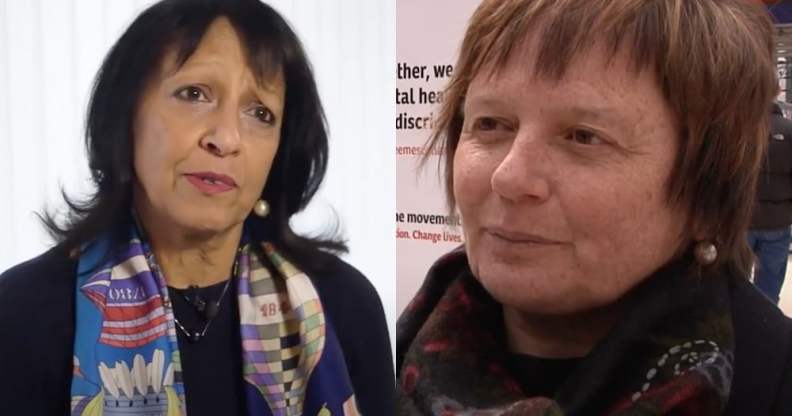Scotland slaps down disgraced UK equalities watchdog and presses ahead with gender law reform

EHRC chair Kishwer Falkner (left) and SHRC chair Judith Robertson (right). (YouTube)
Scotland’s Human Rights Commission (SHRC) has put the Equality and Human Rights Commission (EHRC) in its place, as the Scottish government confirms that its gender recognition reform bill will be introduced next week.
While reforms to the Gender Recognition Act in England and Wales to make it easier for trans people to change their legal gender were ditched by the Tory government in Westminster last year, the Scottish government has confirmed that it’s own Gender Recognition Reform Bill will be brought to parliament on 3 March.
This is despite the best efforts of the EHRC, currently engulfed in scandal over its stance on trans rights and apparent lack of independence from the Tory government, which recommended that the Scottish process be delayed.
Social Justice Secretary @ShonaRobison will give a statement to @ScotParl on 3 March on the introduction of the Gender Recognition Reform (Scotland) Bill.
We committed to introducing this Bill within this parliamentary year.
— Scot Gov Fairer (@ScotGovFairer) February 23, 2022
Last month, EHRC chair Baroness Kishwer Falkner sent a public email to Scotland’s social justice secretary Shona Robison, calling for “more detailed consideration”.
She added: “Like you, we are concerned at the polarised debate on this issue. It is causing much distress to people on all sides.
“We want to work with you and other interested parties to support a careful and respectful discussion of potential changes to the law.”
Falkner rattled off several ‘gender critical’ talking points in her email, which was described by Stonewall as an “attack on trans equality”.
Now, the SHRC has put Falkner’s equalities watchdog in its place, reminding it of its remit.
The SHRC said in a statement: “Under the terms of section seven of the Equality Act 2006, the EHRC is not empowered to take human rights action in Scotland where it falls within the mandate of the Scottish Human Rights Commission. Where it proposes to take such action, it is required to seek our consent.
“The Scottish Human Rights Commission wishes to make clear that the EHRC has not sought our consent in relation to its recent commentary and interventions on the human rights implications of reforming gender recognition processes.
“Therefore, any analysis, commentary or engagement about the human rights implications of this (or any other) devolved legislation and policy is for the Scottish Human Rights Commission to make.”
Get them telt ✌? https://t.co/jcqFm0Ben7— Gigi Henry (@Gigi_h_) February 24, 2022
The SHRC said it “understands and respects” the EHRC’s actual job, and said it was “in everyone’s interests for our two commissions to work together effectively and appropriately”.
SHRC chair Judith Robertson sent a letter to Falkner requesting a meeting “to review the terms of our working relationship, and to discuss the boundaries and interrelationships between our respective mandates”.
Robertson said according to a memorandum of understanding between the two bodies, in the event of conflicting policy positions, they are required to “notify each other prior to making public any such position or reasoning”.
She continued: “We are concerned that this agreed and long-established way of working was not considered or adhered to in this instance.
“We have specific concerns about your Commission’s change of position on the value of introducing legislation to reform gender recognition processes in Scotland, given this now diverges from both our own analysis of the human rights issues engaged, and our previous understanding of your own position.”

